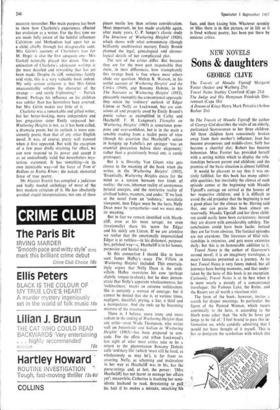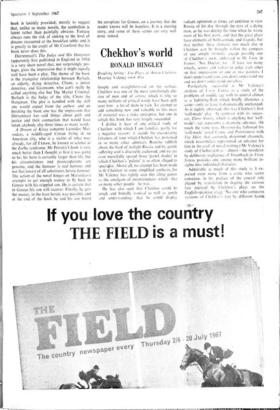NEW NOVELS
Sons & daughters
GEORGE CLIVE
Travel Notes Stanley Crawford (Cape 21s) The Judge and His Hangman Friedrich Diir- renmatt (Cape 18s)
A Dream of Kings Harry Mark Petrakis (Arthur Barker 21s)
In The Travels of Maudie Tipstaff the author of Georgy Girl describes the visits of an elderly, puritanical Scotswoman to her three children. All three children have consciously broken away from their mother's influence; Jean has become prosperous and middle-class; Sally has become a cheerful slut; Robert has become bohemian. Miss Forster has provided herself with a setting within which to display the rela- tionships between parent and children; and the promise of the basic situation is almost fulfilled.
It would be pleasant to say that it was en- tirely fulfilled, for this book has many admir- able qualities; but inevitably the climax of each episode comes at the beginning with Maudie Tipstaff's outrage on arrival at the houses of her respective children; and it is difficult to avoid the old prejudice that the beginning is not a good place for the climax to be. Having said that, one can praise this book almost un- reservedly. Maudie Tipstaff and her three child- ren could easily have been caricatures; instead they are drawn with considerably subtlety. The conclusions could have been facile; instead they are far from obvious. The farcical episodes are not overdone. The literature of filial rela- tionships is extensive, and gets more extensive daily; but this is an honourable addition to it.
Travel Notes is the author of Gascoyne's second novel; it is an imaginary travelogue, a man's fantasies presented as a journey. At its best Travel Notes is very funny indeed, but all journeys have boring moments, and that under- taken by the hero of this book is no exception. Curiously, Travel Notes is at its best when it is most nearly a parody of a conventional travelogue; the Famous Lake, the Ruins, and the Resort are all worth a vicarious visit.
The form of the book, however, invites a search for deeper meanings. In particular, the figure of the Painted Woman, which recurs continually to the hero, is according to the blurb none other than 'the wife he loves yet longs to be rid of.' I feel bound to pass this in- formation on, while candidly admitting that I would not have thought of it myself. This is riot to denigrate the symbolism with which this book is lavishly provided; merely to suggest that, unlike so many novels, the symbolism is latent rather than painfully obvious. Fantasy always runs the risk of sinking to the level of dreams recounted at the breakfast table; and it is greatly to the credit of Mr Crawford that his book never does this.
Dfirrenmatt's The Judge and His Hangman (apparently first published in England in 1954) is a very short novel that, not surprisingly per- haps, gives the impression that it might equally well have been a play. The theme of the book is the triangular relationship between Barlach, an elderly, dying detective, Chanz, a junior detective, and Gastmann, who can't really be called anything else but The Master Criminal. Barlach is the Judge of the title, Chanz the Hangman. The plot is handled with the skill one would expect from the author; and on finishing the book one has the impression that Diirrenmatt has said things about guilt and justice and their connection that would have taken anybody else three times as many words.
A Dream of Kings concerns Leonidas Mat- soukas, a middle-aged Cretan living in an American city, who is a victim of what may already, for all I know, be known to science as the Zorba syndrome. Mr Petrakis'S book is very much better than I thought at first it was going to be; his hero is certainly larger than life. but his circumstances and preoccupations are genuine, and the humour is real humour and not that lowest of all substitutes, heroic humour. The action of the novel hinges on Matsoukas's attempts to get enough money to fly back to Greece with his crippled son. He is certain that in Greece his son will recover. Finally, he gets the money, in the least heroic way possible, and at the end of the book he and his son board the aeroplane for Greece, on a journey that the reader knows will be hopeless. It is a moving story, and some of these scenes are \ et y well done indeed.































 Previous page
Previous page